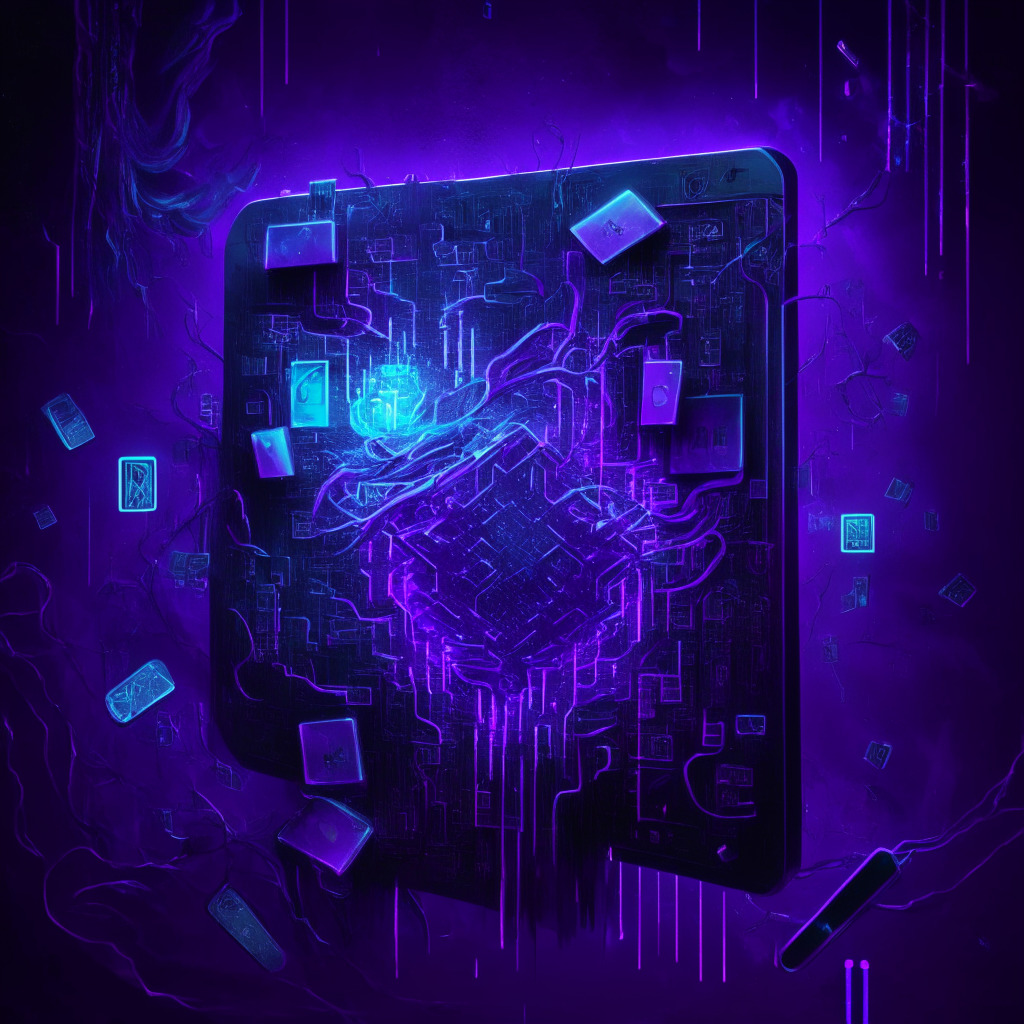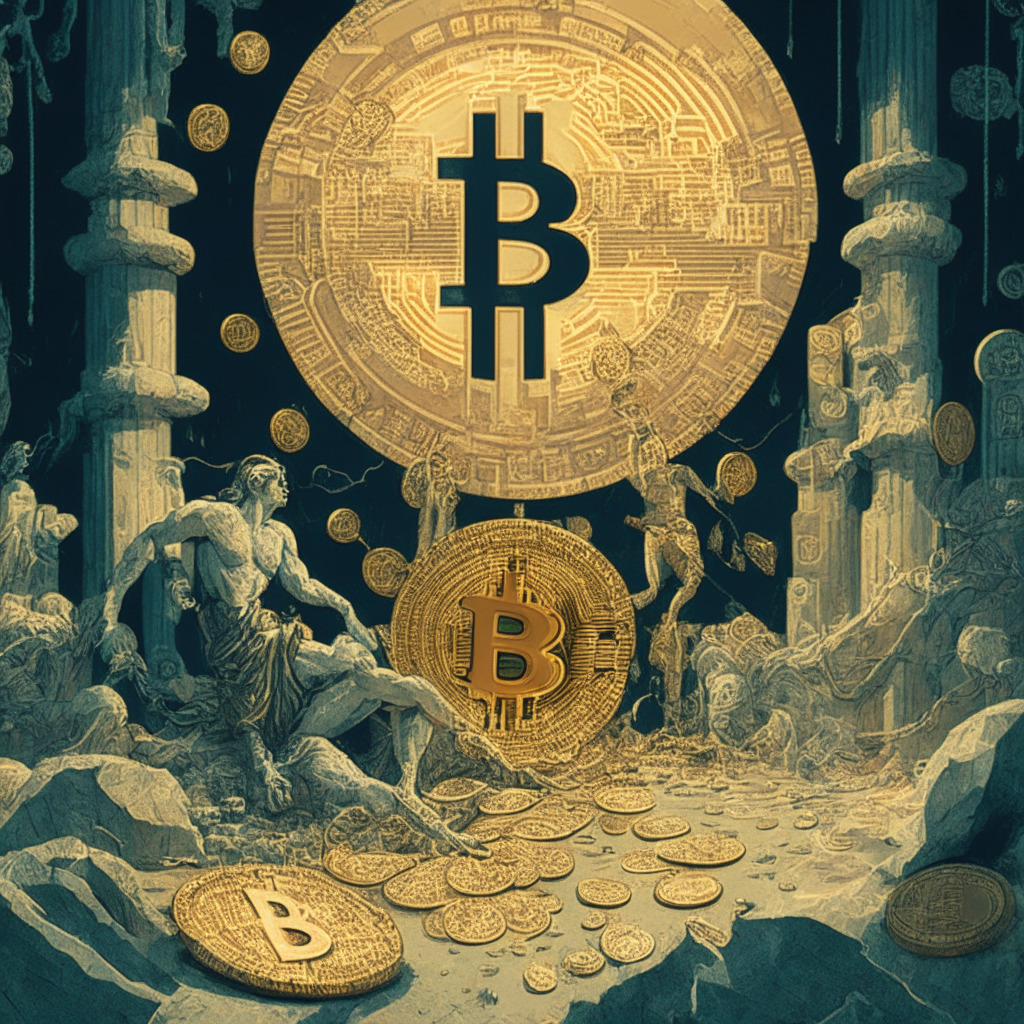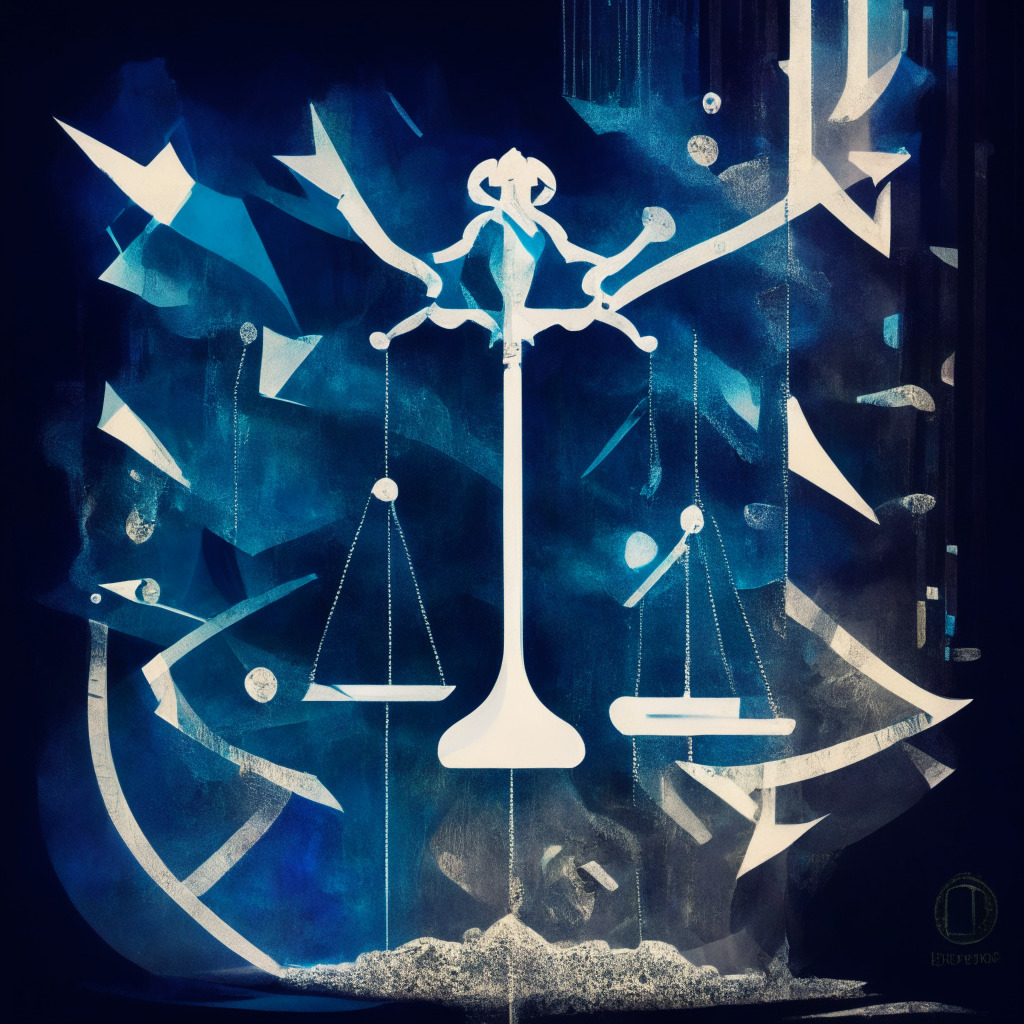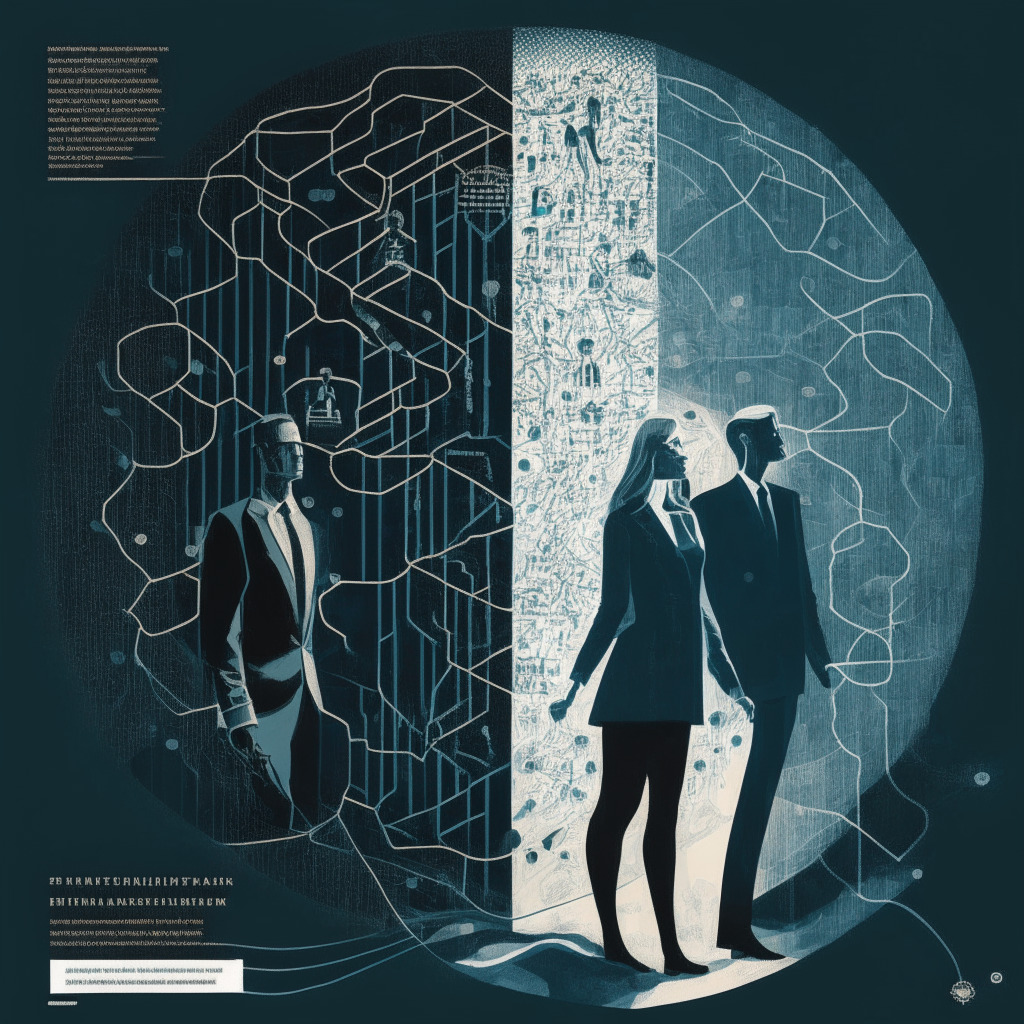“Bahrain’s Bank ABC has partnered with JPMorgan to use its Onyx blockchain for cross-border payments, marking the first Middle Eastern partnership with JPMorgan’s blockchain service. The blockchain-based payments promise to reduce settlement times and costs, initially piloting transactions in the US, UK, Singapore, and Hong Kong, using the US dollar.”
Search Results for: block
Sanctioned Wallets and Blockchain’s Crime Deterrence: Navigating Regulation and Innovation
“The US Treasury recently sanctioned an Ethereum wallet linked to illicit fentanyl trafficking, underlining how blockchain technology can help curb illegal activities. Despite its anonymity, the crypto world can be vulnerable to exploitation by nefarious entities. While some see increased scrutiny as encroachment on privacy rights, without regulation, the blockchain could become a haven for miscreants.”
The US Political Unrest: A Roadblock for Crypto-focused Bills and Digital Asset Future
“The threat of a US government shutdown could influence the future of digital assets. Crypto-focused bills like the FIT, Blockchain Regulatory Certainty Act, and Keep Your Coins Act risk being delayed. Any shutdown could stall these bills’ progress until government funding is secured for the next fiscal year.”
The Rain of Tokens: How Optimism’s 3rd Airdrop Fosters Blockchain Community Participation
“Layer 2 network Optimism launched a third airdrop of OP tokens, distributing 19.4 million tokens to over 31,000 wallets. The airdrop aimed to boost community involvement in the Optimism Collective’s delegation activity and to encourage users to vote in governance.”
Decoding Vitalik Buterin’s Privacy Pool Concept: Navigating Blockchain Privacy & Regulatory Compliance
Ethereum co-founder Vitalik Buterin’s proposed privacy pool concept focuses on combining blockchain privacy and regulatory compliance, sparking meaningful discussion in the crypto world. However, concerns over unclear compliance framework, implementation struggles, and acceptance issues remain to be addressed.
Overcoming MetaMask’s Gas Fee Glitch and Blockchain’s Role in Verifying the Next Moon Landing
A glitch that overcharged MetaMask users on opBNB gas fees has been rectified. Originally, MetaMask’s default fee, calculated on an average of networks, failed to align with opBNB. To address this, MetaMask altered their algorithm to accurately display the network’s fees.
Decoding Blockchain: A Paradigm Shift or Pandora’s Box?
“In the digital finance world, the concept of blockchain technology, offering decentralized digital ledgers, is gaining significant attention. With possibilities extending beyond finance into areas like voting systems and digital identification, blockchain presents potential advantages. However, its volatile nature, security challenges, and regulatory absence present equal risks, prompting the question – are we ready for this double-edged sword?”
Blockchain’s Leap to Outer Space: NASA’s Moon Mission and the Proofs in Data Cubes
“NASA is planning to use blockchain technology to verify its upcoming Moon landings. In partnership with Lonestar and the Isle of Man, NASA will launch a “data cube” payload in February 2024 verifiable using blockchain. If successful, this could change the course of space exploration and blockchain technology.”
Emerging Blockchain Technologies Challenge Bitcoin’s Dominance: The Rise of BTCBSC
“As Bitcoin faces a downward spiral, the rise of new blockchain systems like BTCBSC on BNB Smart Chain begins to gain traction. BTCBSC, echoing early Bitcoin’s supply and pricing, presents unique features like inbuilt staking for passive income, deviating from Bitcoin’s energy-consuming Proof of Work model.”
Mixin Network’s $200M Security Breach: A Case Study in Blockchain Vulnerability and Recovery
Mixin Network’s founder, Feng Xiaodong recently disclosed a substantial $200 million hack on the network’s cloud service provider database. This breach resulted in the compromise of users’ digital assets such as Bitcoin and Ethereum. The company is introducing remedial measures including the issuance of “bond tokens” to offset the loss and boosting their security system. This incident resulted in a 9% dip in token value.
Blockchain’s Paradox: The Clash between Potential and Vulnerability in Light of Recent Mixin Network Hack
The recent hack on Mixin Network, resulting in a loss of approximately $200 million, highlights the vulnerability of blockchain technology. Despite its potential for speed, transparency, and security, hackers were still able to exploit weaknesses, leading to an immediate halt in withdrawals and deposits. It underscores the imperative for stronger defenses against cyber threats in blockchain technology.
Crypto Exchange Upbit’s Close Call: A Lesson in Blockchain Security and Market Resilience
A South Korean crypto exchange, Upbit, recently detected a potentially disastrous scam involving counterfeit Aptos tokens which had entered the crypto ecosystem. The incident emphasized the importance of maintaining secure systems within crypto exchanges, as well as blockchain transparency and safety.
The Rocky Path to Mass Adoption: Can Blockchain be Free, Frictionless, and Familiar?
For wide adoption of blockchain technology, three changes are crucial: free access for users, crafting a frictionless experience, and a familiar interface. The present model’s commercialization is off-putting for most and the focus on complex technicalities creates a barrier for everyday users. Strategic alterations towards user preferences are necessary to overcome these challenges.
Miss Universe Organization Denies Crypto Link: A Cautionary Tale of Blockchain Misadventures
“The Miss Universe Organization has denied involvement with the ‘Miss Universe Coin’ announced at the Philippine Blockchain Week event, treating it as fraudulent. This organization clarified it has no ties to any blockchain or cryptocurrency products and none of these techs influence the pageant’s voting or selection process.”
NFTs Revolutionize Ticketing: South Korean Firm Leaps into a Blockchain Future
“South Korean firm Dreamus is introducing NFT ticketing services through its parent company’s rewards app, offering a unique solution against unauthorized entries common with traditional ticket systems. Ava Labs’ Head of Korea, Justin Kim, sees potential for NFT tickets to address issues like bots and scalpers, while considering challenges like duplicity, and regulation in an unregulated market.”
Nansen’s Security Breach: A Reflection on Blockchain’s Cyber Insecurities
“The blockchain analytics platform, Nansen, recently faced a cyber attack, compromising nearly 7% of the customer’s data. This breach exposed user’s email addresses, hashed passwords, and blockchain wallet addresses, marking a significant insecurity in blockchain technology. Nansen’s security appears leaky as the crypto industry experiences rampant and escalating cyberattacks.”
Google Cloud Dives Deeper into Blockchain: Expanding Services, Fuelling Debates
Google Cloud is intensifying its blockchain involvement by adding 11 new blockchains to BigQuery, aiding users in querying on-chain history off-chain, and understanding asset flow and smart contract interaction. However, this move also centralizes access to blockchain data, possibly contradicting the crypto world’s decentralized ethos.
Google Cloud’s BigQuery Embraces Blockchain: Progressive Leap or Just A Data Grab?
Google Cloud’s data warehouse, BigQuery, has integrated data from 11 new blockchain networks. While seen as a move validating blockchain technology, skeptics view it simply as Google adding another databank. It also launched a feature simplifying blockchain queries, marking a growing focus on blockchain usability and partnerships within the sector.
Unearthing the Bitcoin Enigma: Hal Finney’s Enigmatic Role in Blockchain’s Genesis
This article discusses speculation around Hal Finney’s involvement in creating Bitcoin, his use of zero-knowledge proof systems, and rumors of him being Satoshi Nakamoto. The mystery of Bitcoin’s creation and Finney’s role remains ambiguous and unsolved.
Nansen Blockchain Breach: Spotlight on Crypto Security and Potential for Innovation
Recently, blockchain analytics company, Nansen, experienced a security breach, impacting approximately 6.8% of its users. This incident emphasizes the urgent need for robust security systems, data protection, and a balance between blockchain possibilities and its inherent risks.
Unveiling Blockchain’s Future: A Horizon of Opportunities Amidst Uncharted Risks
“The future of blockchain, while trending, remains uncertain. Despite blockchain’s potential to challenge traditional finance systems with its transparency, security, and speed, concerns such as volatility, regulation, misuse, and environmental impact add layers of skepticism to predictions.”
India’s Strike Against Crypto Fraud: A Blockchain Paradox Unfolds
The Indian Ministry of Home Affairs is developing a Cryptocurrency Intelligence and Analysis Tool (CIAT) to combat crypto fraud. CIAT will monitor dark net crypto wallet addresses, compiling transaction records to detect irregular crypto activities. However, concerns surround its effectiveness given the dark web’s anonymity and the potential for false positives.
Corporate Interest in Blockchain Vs. Crypto Market Predictions: A Bullish Conundrum
“Blockchain technology continues to attract corporate interest despite a crypto market downturn. Some analysts foresee growth in the Bitcoin and Ether markets, albeit possibly more gradual than past rallies. This comes amid shifting monetary policies that could affect market fervor.”
Understanding the Federal Judge’s Ruling and Blockchain Regulation in the FTX CEO’s Case
The federal judge ruled in favor of the DoJ against seven witnesses testifying for ex-FTX CEO, Sam Bankman-Fried (SBF), facing charges related to alleged misuse of user funds. This ruling raises questions on the regulation of blockchain technologies, showcasing a tug-of-war between innovators and regulatory bodies.
Uniswap University: A High Education Beacon or Over-Ambitious Dream in the Blockchain World?
“Uniswap has launched an educational platform, Uniswap University, aimed at creating an organized learning pipeline for users on its V3 exchange. The platform offers insights into blockchain topics and practical simulations, however, it’s unclear if such initiative can practically empower users amidst the complex nature and quick evolution of the blockchain sphere.”
Political Pressure Meets Blockchain: The Shifting Sands of UK’s Crypto Regulatory Landscape
“Former FCA chairman Charles Randell discusses alleged political influence on UK regulatory bodies to adopt cryptocurrency companies. While some see these pressures as compromising, they may catalyze the safe adoption of emerging technologies like cryptocurrency within custom-built frameworks for the digital asset sector.”
Tether’s Undisclosed Investment in Northern Data: A Blockchain Breakthrough or Transparency Crisis?
Tether has made an undisclosed investment in German-based crypto miner, Northern Data Group, potentially involving AI, P2P communications, and data storage solutions. Despite past controversies and questions around its financial management and transparency, this move could signify a turning point for Tether and have significant implications for the blockchain industry.
Gaming Revolution via Blockchain: Proof of Play’s $33M Gamble: Rewarding or Risky?
“Farmville co-creator, Amitt Mahajan, backed by Proof of Play, has secured $33M to develop Web3 games, aiming to revolutionize the gaming sector with blockchain technology. The venture aims to facilitate smooth gameplay and promote decentralization but faces potential complexities and risks of emerging technology.”
CEO Transition at Near Foundation: A Challenge or Opportunity for Blockchain’s Mainstream Adoption?
Marieke Flament, CEO of the Near Foundation, is stepping down from her role, with no specified reason for her departure. Under her leadership, Near Foundation’s treasury balance has grown to an estimated $350 million. Her tenure saw the onboarding of many web2 players, and fostering of web3 innovators, enabling Near to become the 40th largest crypto by market cap. Her departure leaves questions about the future direction of Near.
Bridging Artistry and Blockchain: The Rise of Generative Art in the Crypto Sphere
“William Mapan, a noted NFT artist, likens blockchain-based generative art to drawing guided by the roll of dice. A harmonious blend of predetermined rules and randomness, this form of artistry aims to evoke emotions and trigger personal memories in the audience. Despite market fluctuations, the allure of the unique union of blockchain technology and artistic creativity persists.”
Decentralized Future: How Blockchain Transforms the Adult Content Industry Amidst Controversies
“Content creators are exploring decentralised alternatives amid issues with traditional platforms like OnlyFans and Patreon. Web3 technology promises greater control and financial security, shifting power away from intermediaries. Blockchain-based alternatives like Only1 are offering creators a chance to realise their full earning potential and evade censorship.”
Busan’s Bold Pursuit to be a ‘Blockchain City’: A Step Forward or a Step Too Far?
South Korea’s second-largest city, Busan, seeks to become a ‘Blockchain City,’ building an Ethereum-compatible mainnet for its various blockchain services. The city has allotted a budget of 100 billion won ($75 million) under the Blockchain Innovation Fund (BIF) with hopes to stimulate a seamless transition into blockchain implementation, by enhancing private services’ quality and interconnection.






























